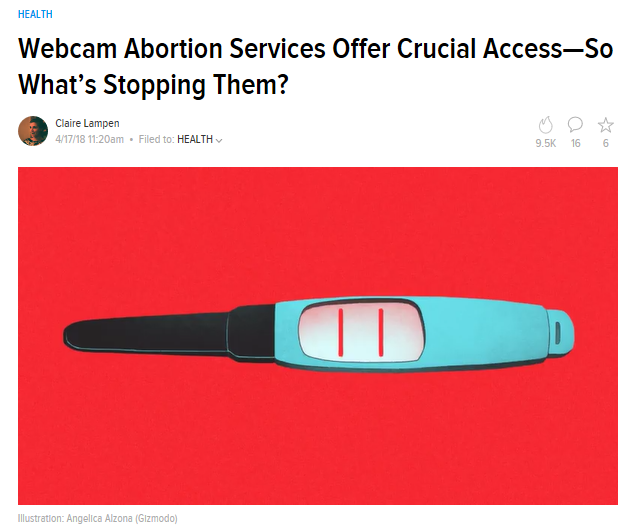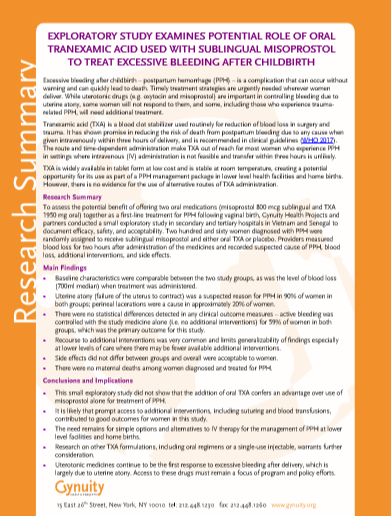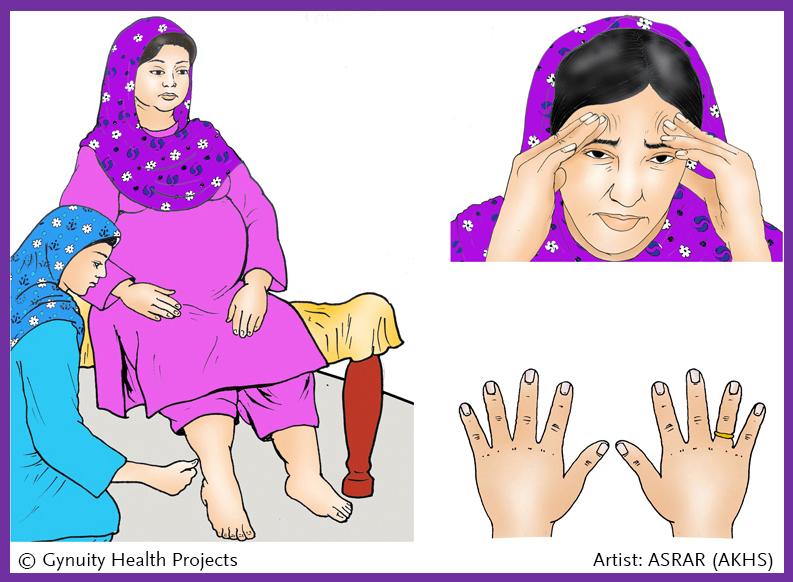|
Greetings from New York,
Preeclampsia and eclampsia are serious conditions of pregnancy, most often characterized by a rapid and unexpected rise in blood pressure with potential life-threatening consequences. We have been working hand-in-hand with clinicians in several countries to develop the evidence base to support advances in diagnosis and management of these disorders. Today is World Preeclampsia Day and this edition's
"Spotlight on..."
feature highlights some of our efforts to extend the reach of preeclampsia and eclampsia care. Results from our work on simple technologies such as the Congo Red Dot urine test and oral antihypertensive regimens could have important implications for the delivery of better quality care in all settings.
|
 |
 Beverly Winikoff
Beverly Winikoff
President
|
|
TelAbortion study featured in the media

Gynuity's TelAbortion study was featured in two recent articles reporting on access
to abortion services in the U.S. The first piece,
Webcam Abortion Services Offer Crucial Access -- So What's Stopping Them?
, was posted on Gizmodo, an online media platform. Cosmopolitan published the second piece,
Abortion's Next Frontier: Video Chat,
in their March issue. The TelAbortion study evaluates the use of telemedicine for providing medical abortion to women who may have difficulty getting to a clinic or may simply prefer this type of service. Women in four U.S. states can receive medications by mail and are followed by their providers remotely. For more information about the study, please visit the
TelAbortion.org
website and read this
one-page document
. We are currently assessing the feasibility of testing similar models of abortion care in countries outside of the U.S.
|
Gynuity collaborates with the National Abortion Federation and Chilean Ministry of Health to train abortion providers in Chile
As part of a joint project to support the introduction of legal abortion services in Chile, Gynuity and the National Abortion Federation (NAF) assisted the Chilean Ministry of Health (MINSAL) in training multidisciplinary teams of OB/GYNs, midwives, social workers, and psychologists in medical abortion care and manual vacuum aspiration (MVA) for first and second trimester abortions. Since December 2017, MINSAL has conducted more than 20 three-day trainings in seven regional hospitals nationwide. NAF and Gynuity sent five training teams to work with six groups of trainees. The training program included background on the recently approved law; values clarification; theoretical background and implementation of medical abortion and MVA; theories and methodology of client counseling; and hands-on practice of techniques.
|
|
NEW MATERIALS ON POSTPARTUM
HEMORRHAGE
|

Summary of research on the potential role of oral tranexamic acid (TXA) to treat excessive bleeding after childbirth
Results from a small exploratory study did not show that the addition of oral TXA confers an advantage over use of misoprostol alone for treatment of postpartum hemorrhage (PPH). Continued access to uterotonic medicines is recommended. Read about
our study.
Summary of research on high fever incidence following treatment with misoprostol for PPH
This
summary describes recent research to assess the role of genetic factors in misoprostol-induced fever and the susceptibility of some populations to misoprostol's thermoregulatory effects.
Summary of research on expanded uterotonic coverage for PPH prevention in rural Senegal
This
document outlines community research in Senegal that led to a national PPH prevention program using misoprostol dispensed by matrones during health hut deliveries and documents the main findings from an assessment to evaluate progress of the program.
"Instructions for Use" brochure: Misoprostol for treatment of PPH
|
Participation in NAF annual meeting
At last month's National Abortion Federation (NAF) annual meeting, Ilana Dzuba (Gynuity) and Mariana Romero (NAF & CEDES) organized and moderated the Jorge Villarreal International Plenary, "
Legal Abortion for the First Time in 28 Years: Translating Law into High-Quality Services," to highlight issues around access to legal abortion care in Chile following the decriminalization of abortion in specific circumstances in 2017. Panelists included Dr. Carolina Asela (formerly of the Chilean Ministry of Health), Dr. Gonzalo Rubio Schweitzer (Hospital San José/Universidad de Santiago de Chile), and Débora Solís Martínez (APROFA) / Carolina Posada (IPPF/WHR). In addition, Gynuity's Senior Medical Associate, Elizabeth Raymond, gave presentations on Gynuity's TelAbortion project (for information about this model of care, please see above) and posters were presented by Gynuity staff. Read more
here.
|
|
NEW PEER-REVIEWED ARTICLES
|
Borovac-Pinheiro, A., Pacagnella, R.C., Cecatti, J.G., Miller, S., El Ayadi, A.M., Souza, J.P., Durocher, J., Blumenthal, P.D., Winikoff, B. "
Postpartum hemorrhage: new insights for definition and diagnosis" Am J Obstet Gynecol. 2018 Apr 13. pii: S0002-9378(18)30294-1. doi: 10.1016/j.ajog.2018.04.013. [Epub ahead of print]
|
SPOTLIGHT ON...
|

Preeclampsia and Eclampsia Care
Gynuity's work in this field helps create the evidence base to advance the diagnosis and management of preeclampsia and eclampsia. New information will accelerate improvements in quality of care for all pregnant women and reduce levels of maternal and perinatal death and disability.
- Screening for preeclampsia. Detecting and treating preeclampsia early can lower the risk of severe outcomes. The Congo Red Dot point-of-care test, which measures urine congophilia, may be an effective tool in screening for preeclampsia especially in low resource settings, where the burden of disease is greatest. Results from our clinical studies in Bangladesh and Mexico evaluating use of this low-cost test are expected later this year.
- Improving management of severe hypertension in pregnancy. Treatment of elevated blood pressure can reduce the risk for maternal complications. Preliminary findings from a study comparing oral labetalol, oral nifedipine and oral methyldopa show that oral regimens can effectively treat pregnant women with severe hypertension without serious maternal or fetal complications and may be offered in settings where intravenous use and careful fetal monitoring are not possible. This research could have important implications for the delivery of high quality care in all settings and will help develop guidance for antihypertensive use in pregnancy.

- Improving care at delivery for women with preeclampsia. Inducing labor is often a critical component of care for women with preeclampsia. Results from a study conducted by Gynuity and colleagues at the University of Liverpool and in India (Mundle et al., 2017) comparing two low-cost interventions (oral misoprostol and the Foley catheter) commonly used in resource-poor settings, found that low-dose oral misoprostol tablets provided a highly effective, non-invasive, low-cost way to induce labor. A new research project in collaboration with the University of Liverpool will examine whether augmentation using oral misoprostol is superior to the standard protocol of intravenous oxytocin in women who have undergone cervical preparation with oral misoprostol.
|
Stay Connected


|
|